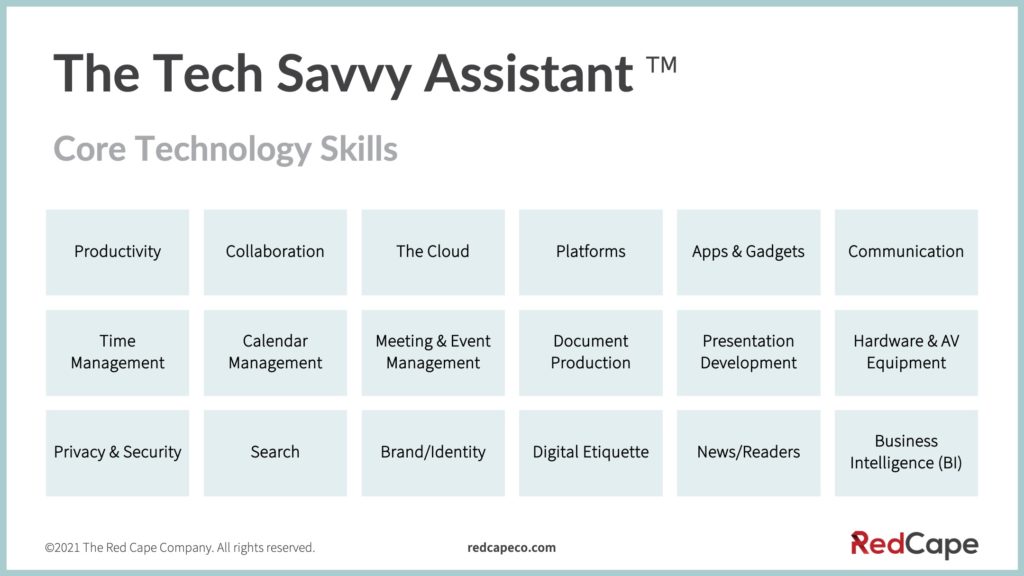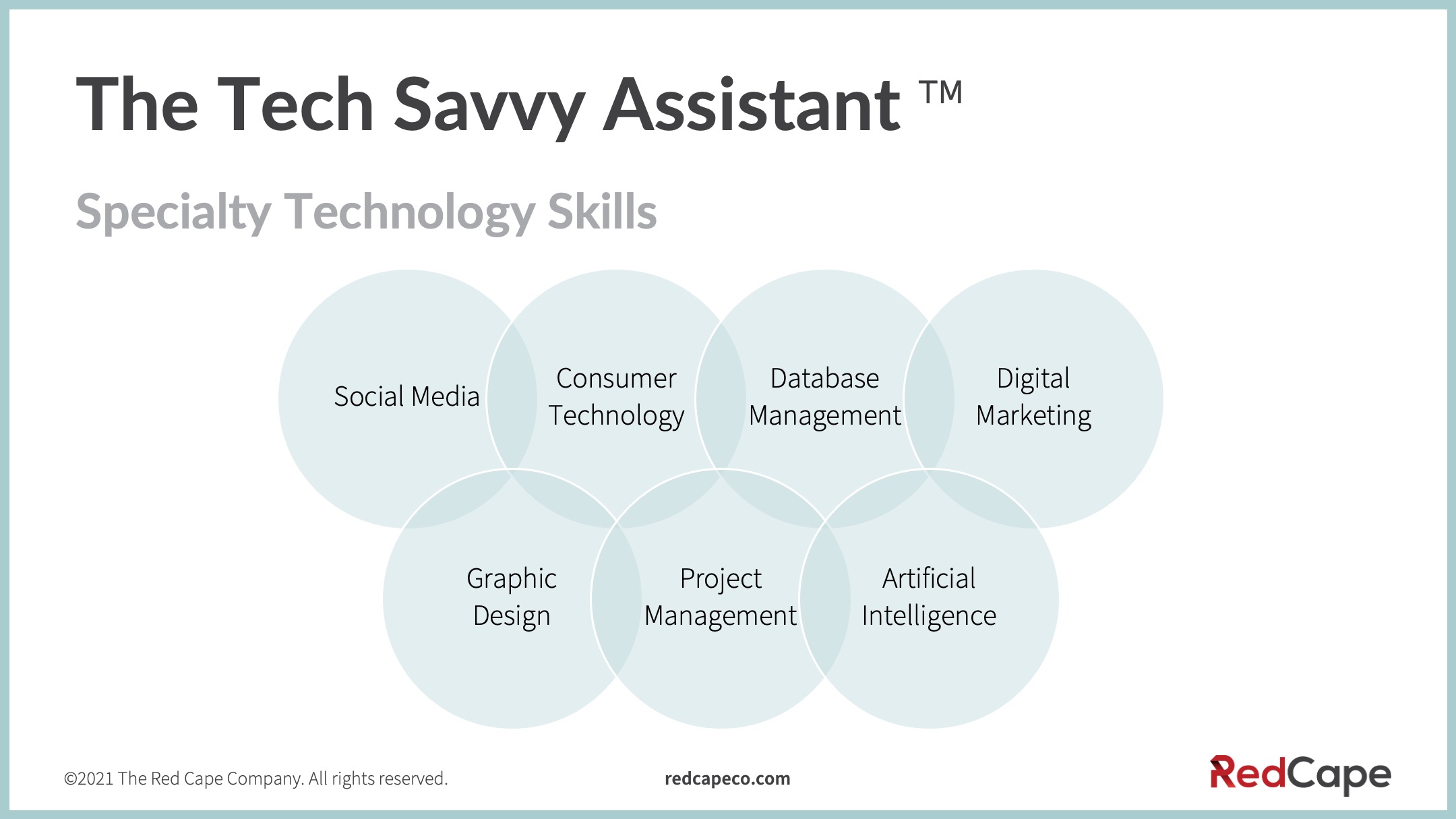What does it mean to be Tech-Savvy?
In this era of immeasurable computing power and technological innovation, we are quickly approaching information and innovation overload! Even as a former assistant turned Microsoft Certified Trainer with nearly 20 years of teaching experience and over 15 technical certifications who teaches Microsoft, Google and Apple productivity around the globe, I regularly find myself in front of the latest technology and software searching for a button that has moved or a feature that seems to have disappeared…or wondering – wait, where is my favorite shortcut?
And just when I finally mastered the ribbon options for Office 2013, I arrive to work to find that the latest incarnation, Office 2016, has been automatically updated and now my machine won’t sync with my phone and is not compatible with my tablet! And while our IT departments are filled with talented individuals who can reconfigure our internal and external networks and help us recover that lost document (thanks, Dave!) – they don’t really use the software in the same way that assistants do! They are brilliant at installing the program or fixing an issue but sometimes they can’t help us figure out how to embed the formatted table into our Outlook appointment that will automatically update in the spreadsheet saved on the shared server!
And now hiring managers are demanding “tech-savviness”! Take a look at any job posting for assistants, and the word “tech-savvy” will certainly be among the requirements. It seems that even before the latest updates roll out on our phones, on our computers, on our tablets, hiring managers are looking for the most experienced applicants – ones that are already experts in the latest software, social media site, or tech toy. I haven’t even heard of Maven 1.0, how can there already be a version 3.3.3 and a population of people who’ve mastered this thing?
We don’t know what we don’t know!
Most technology is easy to use. Open the program and start using it. Need to learn how to use a specific feature? Search for a video on YouTube.
But did you know that this method helps you acquire only 13% of the application’s total functionality. That’s right – only 13%! According to a Microsoft study, the average user hasn’t even discovered nearly 87% of the application’s capabilities. And what’s even more eye-opening is that 94% of user suggestions for additional features already exist in the software! That means that there is a 94% chance that your dream of an Excel update with a simple way to separate first name and last name from the full name column already exists in Excel. And it does!
So where are you in the spectrum between 13% and 87%? Where does a tech-savvy person consider their skills?
I could probably be considered by many as “tech-savvy”. I run a global technology and productivity training company for goodness’ sake! And while I may be an expert in Excel, PowerPoint, Outlook, SharePoint, OneNote, Gmail, Macs, etc., I must admit that I am woefully lacking in many other technologies. (Except YouTube – but who can resist those puppies and kittens?)
So, does being great at a few programs mean that I am tech-savvy? Maybe to a few people, but I certainly don’t feel that way when I open a spreadsheet in Excel and discover a life-changing feature, such as Excel Tables, that has been sitting there for years. True story! I can still remember crying over my keyboard when I discovered tables and realized how much time I had wasted all those years. And then, by the time I’ve mastered the latest features and determined their relevance for assistants, a new version will have come out! Damn you, Head of Excel Versions!! But the truth is learning those new features are the key to getting me out of the office earlier and home to my family in time for dinner.
The fact is: we don’t know what we don’t know! We have to be curious! We have to assess our own proficiency. Are we at 13% or 46% or 75%? For those of you who are certified in Microsoft Office, the good news is, that you are over 80%. If you aren’t certified, then how do you build your own toolkit?
- Search Google!
- Find tech forums!
- Ask questions in support chat windows!
- Use the help function in the program itself!
- Watch Youtube – and not just the puppies and kittens!! – but the tech channels (shameless plug: youtube.com/redcapeco)
- Take online classes and webinars while you are at lunch at your desk (another shameless plug! The RedCape Academy )
Tech-savvy 2.0
So how do we want to redefine tech-savvy? It can’t be related to 1 application or type of device, because those will change too quickly. And it can’t be too broad either. If you want to hire a tech savvy assistant, you have to be specific. What programs do they need to be proficient in? What platform? What apps? What on-going training will be provided for those eager to keep up their skills?
The word itself is so new that many dictionaries don’t even have a definition, but Oxford Dictionaries defines tech-savvy as someone who is “well informed about or proficient in the use of modern technology, especially computers.” But again – which technology? Which computers? It doesn’t even mention social media or apps in that definition! It seems the definition of tech-savvy is already going to need version 2.0!
Definition of Tech-Savvy (2.0):
Adjective, informal
Pronunciation: /tek/·/ˈsavē/
“Embraces relevant technology and actively improves his/her skills through informal and formal learning”
Example Sentences:
- The tech-savvy person embraces change.
- The tech-savvy person enables new features.
- The tech-savvy person is curious and willing to learn.
- The tech-savvy person continually pursues training.
Want to become Tech-Savvy 2.0?
The first step is assessing your level and understanding what you don’t know!

My team and I at RedCape have identified the “Core Technology Skills for Assistants”:
- Productivity
- Collaboration
- The Cloud
- Platforms
- Communication
- Time Management
- Calendar Management
- Meeting & Event Management
- Document Production
- Presentation Development
- Hardware & AV Equipment
- Privacy & Security
- Search
- Brand/Identity
- Digital Etiquette
- News/Readers
- Business Intelligence (BI)

And after traveling the world, and meeting with assistants, their executives, HR departments and job seekers, we’ve also identified “7 Critical Specialty Skills”:
- Social Media
- Consumer Technology
- Database Management
- Digital Marketing
- Graphic Design
- Project Management
- Artificial Intelligence
So do you possess these skills? Are you working towards these skills?
Want to get started on your tech-savvy journey? Check out our calendar for upcoming online classes and events, and join the RedCape Academy to continue your learning.
Note: This is a reprint of our article in Executive Secretary Magazine.
